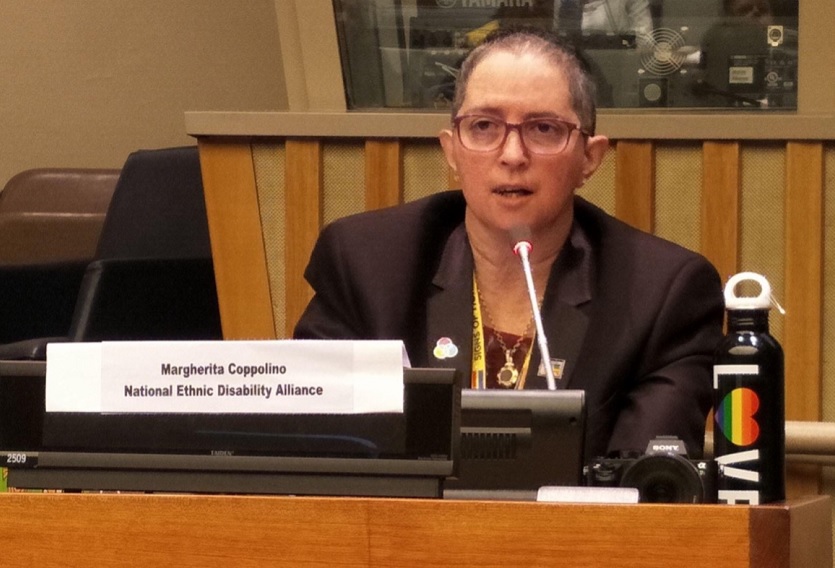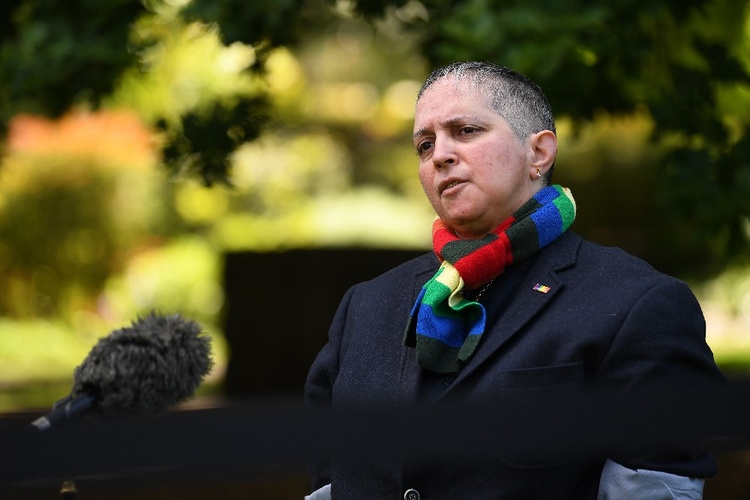Coppolino is a proud feminist, photographer and inclusion/intersectionality consultant and advisor to government, business and social justice organisations.
Over the decades, she has made waves in her work as an advocate for disability and the LGBTQIA community.
“I love creating pathways for the next generation,” she says.
However, much of Coppolino’s success is built on a past that has required a great deal of courage to confront and heal from.
Born in Melbourne to an Italian mother, Coppolino was a ward of the state for the first 17 years of her life and only discovered her family background and cultural heritage once she became an adult.
“My mother migrated to Australia from Sicily in 1959 to join my grandfather, who was already living in Maidstone,” she says.
“She fell pregnant on the ship coming to Australia; she later disclosed to welfare that she was raped.
“She worked as a machinist in Flinders Lane until late in her pregnancy.
“Then she drove to St Joseph’s Babies Home in Broadmeadows, which was where all the unwed mothers went to have their babies and give up them up for adoption.
“I think if it were 2020, it would’ve been a very different story.
“But she was Catholic and unwed; also the circumstances under which she fell pregnant would’ve been very traumatic for her.”
In those days, if a child was born with a medical condition, law prevented them from being adopted.
Born with a short statured condition, Coppolino spent the first 17 years of her life as a ward of the state under this law.
Around the age of three, she was moved to St Catherine’s Children’s Home in Geelong.
“It was a big orphanage with 250 children so I had lots of brothers and sisters, if you want to put it that way,” she smiles.
In her early teens, she was transferred to St Vincent de Paul Children’s Home in Black Rock for a year, before being transferred to a family group home.
“I lived with a married couple in Caulfield North for about five years, and when I was 17 they put me into a hostel for girls.
“When I turned 18, I moved into a hostel in the city; I stayed there for a little while before I moved into a flat on my own and became independent to my ability.”
Coppolino says she had always questioned what happened to her parents from as early as she could remember.
“After I turned 18, I searched the electoral rolls,” she says.
“Things were quite different back then; there were no computers and I had to go through all of the paper documents at the library.
“I found my grandparents, who happened to be in Maidstone; apparently a lot of the Greek and Italian migrants settled in the western suburbs when they docked.
“It’s a bit of a coincidence that I’m living in Seddon 60 odd years later; this area is where my mother first lived and this is where I’ve ended up.
“I spoke to my mother once on the phone, when I was in my 30s, and I discovered that I had two younger sisters and a brother from her first marriage, after I was born.”
When Coppolino set out to build a life of her own, she began packing laundry in Chapel Street to earn a living; eight months later, she entered the public service under a scheme for people with disability at the time.
After working as a clerical assistant for nine years, Coppolino began to feel a burning desire to do more.
She was then hired as an employment officer for the Commonwealth Employment Service, a role which she found to be “highly rewarding”, before being transferred to the state government.
“[The then premier] Jeff Kennett pulled the plug on the work that I was doing, so I became unemployed and I didn’t know what to do at that point,” she explains.
I was at college doing a Certificate in Training because I really liked training, and somebody asked me why I didn’t start my own business... So I did.”

Margerita Coppolino speaking at a side-event for the UN Convention on the Rights of Persons with Disabilities (CRPD) in New York
Coppolino admits that she rejected her Italian heritage for much of her life.
“In my early 20s, I really denied my cultural background because I had no link to it and no idea what had happened to my Italian family,” she says.
“Growing up in an orphanage, there was nothing in my childhood that was traditionally Italian.
“When I saw Looking for Alibrandi, I cried seeing what I’d missed out on.
“In my late 30s, I was befriended by an Italian person who knew my story and their family [the Macali family] started inviting me to bottle tomatoes and do all the Italian things that I’d missed out on.
“Then in 2009, I travelled to Castroreale, the village where my mother came from.
“When I landed there, I was overwhelmed by emotions; it felt as though I were coming home.
“When I came back from that trip I felt really proud of being a Coppolino and nobody could take that away from me.
“Just because I hadn’t met my natural parents or siblings it didn’t mean I wasn’t Italian; I’m very much a part of the Italian community.”
A few years later, Coppolino managed to track down her brother thanks to social media.
When welfare reached out and asked if Coppolino’s siblings would like to meet her, they responded: “We’ll reach out to her later, but we can’t right now.”
“I suspect my mother asked for us not to meet because the circumstances for her must’ve been very difficult,” Coppolino says.
“I’ve always respected my mother for that; it was tough for her.
“There’s a photo of me as a baby and you can slightly tell that I have a disability; she would’ve seen it as a curse for falling pregnant out of wedlock.”
Coppolino is the president of the National Ethnic Disability Alliance (NEDA), chair of the disability sub-committee at the International Lesbian, Gay, Bisexual, Trans and Intersex Association – Oceania Region (ILGA Oceania), chair of the statewide CALD disability network at the Ethnic Communities’ Council of Victoria (ECCV) and a committee member of the Victoria LGBTIQ+ Taskforce.
While Coppolino has become a pioneer for diversity and intersectionality, it took her many years to come to terms with her intersectional identity, which encompasses her sexuality as well as her cultural background and disability.
“Unfortunately, I’ve experienced sexual abuse in some circumstances and I think that’s had an impact on me developing intimate relationships,” she says.
“When I did the Royal Commission for children with sexual abuse I actually did a private hearing and when I did that I started to heal.
“It was one of the most powerful things that I’ve done in my life.”
Coppolino says the presence and support of strong women throughout her career have helped her to thrive.
“I’m surrounded by strong women and I still see my mother as a strong woman for what she did and what she made of her life,” she adds.
“She was resilient and I’ve always been proud of her.”
In 2018, Coppolino was invited to the UN Convention on the Rights of Persons with Disabilities (CRPD) in New York; while there, she had the opportunity to tell her story at a side-event on the LGBTIQA community.
“For me that was a career highlight – asking the world to embrace members of the LGBTIQA community with disability,” she says.
Even more recently, Coppolino was inducted into the Disability Lifetime Achievement Honour Roll at the 2021 Victorian Disability Awards for her work with NEDA.
Coppolino hopes that her achievements can inspire young people to embrace their identity and reach their full potential.
“Today there’s a lot more talk about equal opportunity and diversity, and I’ve become much more comfortable in my skin around all of my intersectional lenses,” she concludes.
“My biggest fear of meeting my mother was always telling her about my sexuality, not my disability.
“I really hope that this will no longer be an issue and that there is an ever-increasing sense of safety for future generations.”












